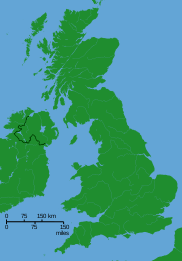|
This is a page currently being developed in this users' sandbox.
|
Yelland is a small village in North Devon between Instow and Fremington in the English county of Devon. Yelland is included within the parish of Fremington.
Bronze Age Megalithic Site edit
Near Lower Yelland Farm is a Bronze Age megalithic site consisting of a double stone row. The rows are parallel, 34m long and 1.8m apart. The individual stones are spaced at intervals of between 2 and 2.3m, forming lines that are oriented roughly east-west. Unlike other stone rows, Yelland site at the river's edge rather than on higher moorland and its construction suggests links with the builders on Dartmoor through the Torridge valley.
Since its construction, thousands of years ago, the site has been smothered by silt from the widening of the River Taw, and the stones can now only be seen during exceptionally low tides.
About Yelland edit
There are around 2000 people living in Yelland, which mainly consist of the older generation, although many younger people live there and commute into the local towns of Barnstaple and Bideford. Yelland has its own not-for-profit community magazine 'Localink' which is delivered free in the area.
Village Amenities edit
Yelland has one shop - Riviera Stores - and a Post office which is within the same building as the stores. Residents use the nearest major village Fremington, or the slightly smaller village of Instow for their daily needs. Supermarkets are located in the nearest towns - Barnstaple and Bideford. There is no church.
Regular bus services are mainly operated by First Devon and Cornwall. Stagecoach also operate a limited set of routes through the village. The nearest railway station is Barnstaple railway station, and Exeter International Airport is the nearest passenger international airport by road.
Schooling edit
Children in the area generally attend Fremington or Instow Primary Schools at primary school age, or Bideford College, Pilton Community College or The Park Community School at secondary school age. College students attend either Bideford College's sixth form, or North Devon College.
Walking Trails edit
Visitors to Yelland and the surrounding area enjoy the views and scenic paths for walking. The Tarka Trail and South West Coast Path are easily accessible from the Yelland Power Station Road.
Power Stations edit
East Yelland Coal-fired Power Station edit
The East Yelland Power Station was once an operational coal-fired electricity production plant located in a partially hidden area on the estuary, next to the tarka trail. The power station was one of only two located to the west of Hinkley Point.
The power station was opened on 21 April 1955 [1] by Lord Fortescue. In March 1984, it was announced by the South Western Electricity Board that the power station would close by the end of October that year. [2]
Fuel for the power station was obtained from coal mines in South Wales, and was transported up the river and onto a jetty specially constructed for the power station. However, due to the closure of these coal mines in the 1980s, coal would be more expensive to obtain from other areas of the country. Therefore, it was more economical to close the power station, which was not very efficient anyway.
Today, most of the power station, which covered an area of 3.1ha, has been demolished.
References edit
External links edit
- Map and aerial photo of Yelland from Multimap.com
- Information about the Megalithic site including photos and an aerial photo showing is location
- The Yelland Stone Row Project
